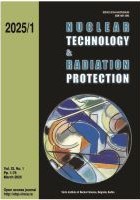
DIRECT ANALYTICAL EFFICIENCY ASSESSMENT OF THE NaI(Tl) GAMMA-RAY DETECTOR (ROMASHKA)
Pages: 22-36
Authors: Abouzeid A. Thabet, Mohamed S. Badawi, Ayman Hamzawy, Ivan N. Ruskov, Mohamed I. Badawi, Ivan A. Sirakov, Yuri N. Kopatch, Dimitar N. Grozdanov, and Bohaysa A. SalemAbstract
The present study focuses on the analytical and numerical calculations of the solid angle, effective solid angle, efficiency, and gamma-ray average path length within the detector materials as a function of the source position. This analysis is conducted for a Romashka module of the 4p NaI(Tl) gamma-ray detector array (NaGRaDA). NaGRaDA comprises 2·2 p gamma-ray detector modules, with each module consisting of six NaI(Tl) crystals arranged in a compact configuration resembling a Daisy flower (known as Romashka in Russian). Each of the twelve scintillators has a unique design, distinguishing them in shape and size from conventional scintillation detectors. This type of 4p multi-detector system is applicable for measuring gamma radiation from samples exhibiting very low activity. It is employed in neutron activation analysis and prompt-gamma neutron activation analysis. Furthermore, this system can be instrumental in the experimental investigation of the characteristics of neutron-induced nuclear reactions. The results obtained throuh direct analytical and numerical methods will be compared with the upcoming comprehensive characterization of the upgraded and modernized Romashka NaGRaDA. This comparison will utilize GEANT4 simulations alongside standard point-type gamma-ray sources.
Key words: 4p multi-detectors array, geometrical solid angle, total efficiency, average path length
FULL PAPER IN PDF FORMAT (2,01 MB)
